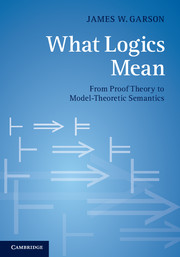Book contents
- Frontmatter
- Dedication
- Contents
- Preface
- Acknowledgements
- 1 Introduction to model-theoretic inferentialism
- 2 Deductive expression
- 3 Local expression
- 4 Global expression
- 5 Intuitionistic semantics
- 6 Conditionals
- 7 Disjunction
- 8 Negation
- 9 Supervaluations and natural semantics
- 10 Natural semantics for an open future
- 11 The expressive power of sequent calculi
- 12 Soundness and completeness for natural semantics
- 13 Connections with proof-theoretic semantics
- 14 Quantifiers
- 15 The natural semantics of vagueness (with Joshua D. K. Brown)
- 16 Modal logic
- Summary
- References
- Index
Preface
Published online by Cambridge University Press: 05 June 2014
- Frontmatter
- Dedication
- Contents
- Preface
- Acknowledgements
- 1 Introduction to model-theoretic inferentialism
- 2 Deductive expression
- 3 Local expression
- 4 Global expression
- 5 Intuitionistic semantics
- 6 Conditionals
- 7 Disjunction
- 8 Negation
- 9 Supervaluations and natural semantics
- 10 Natural semantics for an open future
- 11 The expressive power of sequent calculi
- 12 Soundness and completeness for natural semantics
- 13 Connections with proof-theoretic semantics
- 14 Quantifiers
- 15 The natural semantics of vagueness (with Joshua D. K. Brown)
- 16 Modal logic
- Summary
- References
- Index
Summary
Preface
Syntax all by itself doesn’t determine semantics
D. Dennett (1984, p. 28)Where does meaning come from? There is no more compelling question in the philosophy of language. Referentialists seek an answer in a correspondence between word and object, statement and reality. Inferentialists look to an expression’s deductive role, its contribution to the web of relations that determine what follows from what. Logic is the perfect test bed for assessing the merits of inferentialism. The deductive role of the connectives for a given system is defined precisely by its rules. Whether the meanings of the connectives are determined by those roles is now a question with a rigorous answer. This book proves what some of those answers are, revealing both strengths and weaknesses in an inferentialist program for logic. The results reported here are only the tip of an iceberg, but they illustrate the important contribution that metalogic can play in resolving central puzzles in the philosophy of language.
To make headway on this project, we need to explore the options in syntax, in semantics, and in ways to plausibly bridge the two. On the syntactic side, we are faced with a rich variety in the systems of logic. This book examines only intuitionistic and classical rules for propositional logic, and then briefly, rules for quantified and modal systems. So this is just a start. A second important source of syntactic variation is rule format. The details about the way the rules of a logical system are formulated affect whether that system allows unintended interpretations of its connectives. In the same way that moving from first-order to second-order languages strengthens the expressive power of the logic, so does the move from axiomatic formulations, to natural deduction systems, and to sequent calculi with multiple conclusions. Answers to questions about what logics mean depend crucially on which format is chosen. The moral is that inferentialists who claim that inferential roles fix meaning are duty bound to specify what kind of rules undergird those roles.
- Type
- Chapter
- Information
- What Logics MeanFrom Proof Theory to Model-Theoretic Semantics, pp. xi - xivPublisher: Cambridge University PressPrint publication year: 2013



